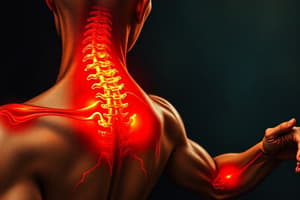Podcast
Questions and Answers
What is the most common cause of hypovolemic shock?
What is the most common cause of hypovolemic shock?
- Severe dehydration
- Traumatic blood loss (correct)
- Severe edema
- Ascites
What is the primary goal in the treatment of hypovolemic shock?
What is the primary goal in the treatment of hypovolemic shock?
- Restore intravascular volume (correct)
- Apply pressure to the bleeding site
- Treat underlying cause of dehydration
- Administer vasoactive medications
What positioning technique is recommended in the management of hypovolemic shock?
What positioning technique is recommended in the management of hypovolemic shock?
- Prone position
- Sitting position
- Supine position
- Modified Trendelenburg position (correct)
What is the initial management for hemorrhage in hypovolemic shock?
What is the initial management for hemorrhage in hypovolemic shock?
If fluid administration fails, what type of medications are given in the management of hypovolemic shock?
If fluid administration fails, what type of medications are given in the management of hypovolemic shock?
What is the first priority in the management of patients with multiple injuries?
What is the first priority in the management of patients with multiple injuries?
What should be assumed for patients with multiple trauma until proven otherwise?
What should be assumed for patients with multiple trauma until proven otherwise?
What is the immediate threat to life that requires the highest priority for immediate treatment in trauma patients?
What is the immediate threat to life that requires the highest priority for immediate treatment in trauma patients?
What is the priority management for patients with multiple injuries in terms of assessing and treating injuries?
What is the priority management for patients with multiple injuries in terms of assessing and treating injuries?
What is the appropriate treatment for patients experiencing controlled hemorrhage in a trauma center?
What is the appropriate treatment for patients experiencing controlled hemorrhage in a trauma center?
Flashcards are hidden until you start studying
Study Notes
Hypovolemic Shock
- Most common cause of hypovolemic shock is hemorrhage.
Treatment of Hypovolemic Shock
- Primary goal is to restore circulating blood volume.
- Recommended positioning technique is Trendelenburg's position.
- Initial management for hemorrhage is to control the bleeding.
- If fluid administration fails, vasopressors are administered to increase blood pressure.
Management of Trauma Patients
- First priority is to address life-threatening injuries.
- Patients with multiple trauma should be assumed to have a spinal injury until proven otherwise.
- Immediate threat to life that requires highest priority is airway obstruction.
- Priority management is to assess and treat injuries in a sequence of airway, breathing, circulation, and disability (ABCD).
Controlled Hemorrhage in Trauma Center
- Appropriate treatment is to control bleeding and restore blood volume.
Studying That Suits You
Use AI to generate personalized quizzes and flashcards to suit your learning preferences.




